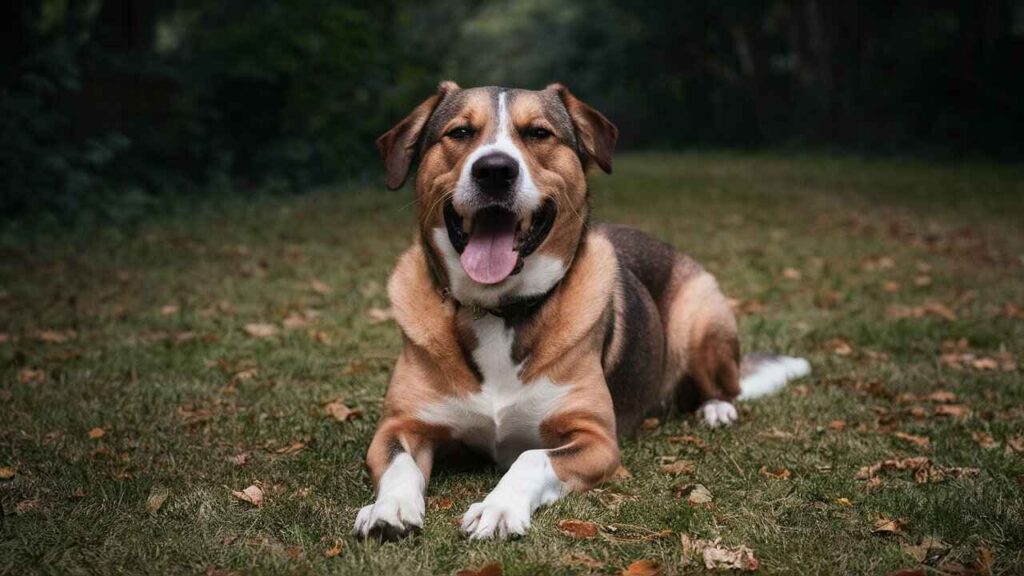It can be alarming to see your dog breathing heavily at night. Understanding the reason behind this is vital for his/her wellbeing. Although panting in dogs is common, nighttime panting might indicate a more serious problem. This article will help you identify why dogs pant at night.
Why Do Dogs Pant?
Panting is one way through which dogs cool themselves down naturally. Unlike humans, they do not have sweat glands and that’s why they resort to panting as their mechanism of cooling the body. It helps them reduce their temperature when it is very hot or they are exhausted from excessive exercise. Besides, it could be a sign of anxiety, excitement or even pain. These various rationales can enable you to find out what causes your dog to breathe heavily at night.
Common Causes of Nighttime Panting
Overheating
A simple explanation for heavy panting during the night may be due to overheating especially in summer and poorly ventilated sleeping areas for dogs. To prevent this, make sure that they sleep in a cool place with fans or air conditioning systems and give them enough water.
Anxiety and Stress
Dogs also experience anxiety and stress just like human beings do which results in heavy breathing. They become anxious by either unfamiliar surroundings, changes in routine or loud sounds such as thunderstorms and fireworks on 4th July etc., For instance, moving homes can cause feelings of unease among dogs while the sound of fireworks or storms create tremendous panic within them. Consequently, these triggers should be addressed appropriately otherwise their well-being is compromised.
Pain or Discomfort
Excessive panting may imply that your dog is experiencing some kind of agony because of injury, arthritis or any underlying health problems that it may have . If your pet pants more than usual particularly at night then look out for other signs such as limping crying and differences in behavior since those are signs that it may be experiencing pain . In case your dog always breathes with an open mouth overnight or during the day, it has to visit a Veterinarian who will diagnose and treat the cause of the problem.
Health Issues Related to Nighttime Panting
Respiratory Problems
Sometimes, cases such as bronchitis or laryngeal paralysis can lead to excessive panting especially when dogs are trying to sleep. These problems usually require veterinary treatment. Once panting is accompanied by coughs and labored breathing in dogs you should see a veterinarian as soon as possible.
Heart Disease
Increased panting might be due to heart conditions where the body struggles to get enough oxygen. Normally, this comes alongside other signs like coughing and tiredness. Regular medical check-ups will help detect these problems earlier for their better control. Early detection and treatment of heart diseases is necessary because they can be fatal.
Cushing’s Disease
Cushing’s disease or hyperadrenocorticism results from increased cortisol production and it leads to excess panting by animals suffering from it. Treating this illness involves medical diagnosis for example, Cushing’s disease symptoms include an increase in thirstiness, hunger and passing urine then immediately go ahead and confirm if at all my dog has this condition by taking it to its doctor.
Environmental Factors
Room Temperature
Ensuring that your dog sleeps in an environment that is cool enough is very important . Dogs may overheat leading them into heavy breathing if temperatures within their sleeping rooms are high . A cooler set up could be achieved using fans or air conditioners while well-ventilated chamber walls with light bedding materials can prevent overheating too.
Beddings and Sleeping Areas
The kind of beddings your dog uses can also make them either comfortable or uncomfortable. Make sure they have a cool-breathing place for resting. Orthopedic beds can help with joint pain and general comfort especially in older dogs. Keeping their sleeping area clean and cosy can go a long way in reducing night time panting.
Anxiety and Stress in Dogs
Causes of Anxiety in Dogs
Several things can cause anxiety in dogs including changes within the environment, firework explosions or thunderstorms and isolation from their owners. Identifying these triggers may help you manage the anxiety. Knowing what makes your dog anxious will assist you create a less stressful setting for him/her.
How Anxiety Affects Nighttime Behavior
A stressed dog may pant excessively at night due to fear. For both of you as well as your pet this leads to sleepless nights. Behavioral training and calming products are used to address anxiety. Consistent schedules and use of positive reinforcement goes a long way towards reducing nighttime anxiety.
Recognizing Pain and Discomfort
Symptoms of Pain in Dogs
Dogs that limp, cry, or pant exceedingly are showing signs of pain. When you see any of such, it is important to dig deeper into it by consulting a vet for advice. Your dog’s actions will tell the reason why it is pained since pain can come from various sources.
Common Sources of Pain
These include injuries, arthritis, dental problems as well as internal issues like gastrointestinal distresses among others.Regular check-ups will enable you detect such conditions early enough thus enabling timely management.Ensuring that your dog has healthy diet and proper exercise goes along way towards prevention some common sources of pains too.

When to See a Veterinarian
Indicators of Serious Health Issues
If your dog’s panting is accompanied by other symptoms like coughing, lethargy, or changes in appetite, it’s crucial to seek veterinary advice. Early detection is key in avoiding any serious health problems. A regular vet and keeping an eye on your dog’s welfare will guarantee its well-being.
Importance of Timely Medical Intervention
Timely medical intervention can prevent minor issues from becoming serious health problems. Regular check-ups and monitoring your dog’s health are essential for their well-being. At the first sign of trouble consulting a vet can make all the difference.
Managing Overheating in Dogs
Tips for Keeping Your Dog Cool
Ensure that your dog remains hydrated, provide shade and do not overwork him/her during hot days. Cooling mats or fans help keep dogs comfortable hence preventing overheating. Adequate water supply as well as a cool resting place is important during hot seasons.
Ideal Sleeping Conditions
Also ensure that your sleeping area is cool ventilated, free from excessive bedding materials which may trap in heat this would greatly reduce panting at night and improve their comfort levels while they sleep on it. By making the environment cool and cozy, they may get better rest at night.
Creating a Comfortable Sleep Environment
Choosing the Right Bedding
Choose beddings that are breathable, fit for seasonal variations.memory foam or orthopedic beds can relieve joint pain in dogs also providing a better support to them.Comfy beddings enhance sleep quality in addition to lessening night time panting.
Optimizing the Sleep Area
Make sure that the sleeping area is quiet dark and comfortable.A serene environment makes it easier for one’s pet to have a good night rest thus reducing nighttime panting.When noise is reduced and calm space created then it helps your dog feel more secure and relaxed.
Addressing Anxiety and Stress
Behavioral Training Techniques
Techniques of training such as desensitization and counterconditioning will help to mitigate the anxiety triggers. When it comes to successful behavioral training, consistency and patience are all that is needed. There is also an option of going for a professional trainer who can be helpful in dealing with extreme anxiety complications.
Use of Calming Products
Calming products like pheromone diffusers, anxiety wraps, and natural supplements can relax your dog. Before you try new products, always remember to confer with your veterinarian. These products also provide extra help in managing the fearfulness of dogs.
Diet and Hydration
Importance of Proper Diet
A balanced diet is important for the general health of your dog. Make sure they have the right nutrients for their activity level and health needs that will prevent exhaustion related ailment. Your good quality food intake could make a huge difference on your pet’s state.
Ensuring Adequate Hydration
Especially during hot weather or after exercise, constantly provide clean water and monitor your dog’s water intake at an age. In order to keep well hydrated helps reduce overheating while maintaining healthiness in a pet keeping them safe from any illnesses.
Monitoring Your Dog’s Health
Regular Check-Ups
Veterinary visits on a regular basis allows detection of potential medical issues early enough before they become serious problems. If you have any questions regarding your dog’s wellbeing consult with your vet about it. Regular visits can assist you in preserving their health as well as ward off serious illnesses.
Keeping a Health Diary
Keep track of changes in behavior, diet or physical condition by creating a diary dedicated to tracking the animal’s health conditions. This information could be very useful when it comes to diagnosis and treatment by vets especially when recorded appropriately. The information jotted down here might become useful when consulting with vets later on.
Home Remedies and Tips
Natural Remedies for Calming Dogs
Anxiety in dogs can be treated holistically using natural remedies like chamomile, valerian root, and CBD oil. Before you try any new medication, ensure you consult with your vet to establish their safety and effectiveness. These treatments could form the basis of a whole treatment of dogs’ anxiety.
Tips for a Restful Night
A consistent bedtime routine will make your dog sleep peacefully at night, ensure that it has a comfortable sleeping area; also it should be well exercised during the day. Sleeping better at night is possible with these steps taken by your dog. A predictable routine and calm environment significantly boosts a dog’s rest during the night.
Conclusion
Understanding why your dog pants at night is crucial for their health and comfort. Whether it’s due to overheating, anxiety, or an underlying health issue, there are steps you can take to help. Monitor his behavior as well as create good sleeping conditions seeking advice from veterinarians where necessary. This will ensure good health for your pet while giving you peace of mind.
FAQs
Why is my dog panting so much at night?
Panting during nighttime might be as a result of heat build up inside the body or episodes of anxiety on top of other issues associated with dark breathings such as respiratory or heart disorders? Keep watch over him/her and seek medical assistance if necessary organizing different solutions based on what has been identified.
How can I help my dog stop panting at night?
To reduce excessive nocturnal breathing in dogs, always ensure that its resting place is cool enough while treating anxiety cases besides having it checked by the veterinary officer who may rule out some sicknesses too.This is one way through which nighttime panting may decrease considerably in them.
Can my dog pant at night because of anxiety?
Indeed, nighttime panting in dogs can be caused by anxiety. Reducing the incidence of panting is possible through determination and focusing on the source of anxiety . There are various measures that can be implemented to deal with this including training a dog to behave well and utilize natural tranquilizers.
When should I visit a vet if my dog pants at night?
If coughing, lethargy, or changes in appetite accompany your dog’s panting, seek advice from a veterinarian. It is important to intervene early enough before things go out of hand.
What are some natural remedies for calming a panting dog?
Chamomile, valerian root and CBD oil are some examples of natural cures that may sooth an anxiety-ridden animal; however it is always best to consult a qualified veterinarian prior to experimenting with new treatments like these ones . These can contribute towards managing your pet’s anxiety holistically.
Also Read: Support Pets: Your Key to Mental Wellness and Emotional Stability in 2024





